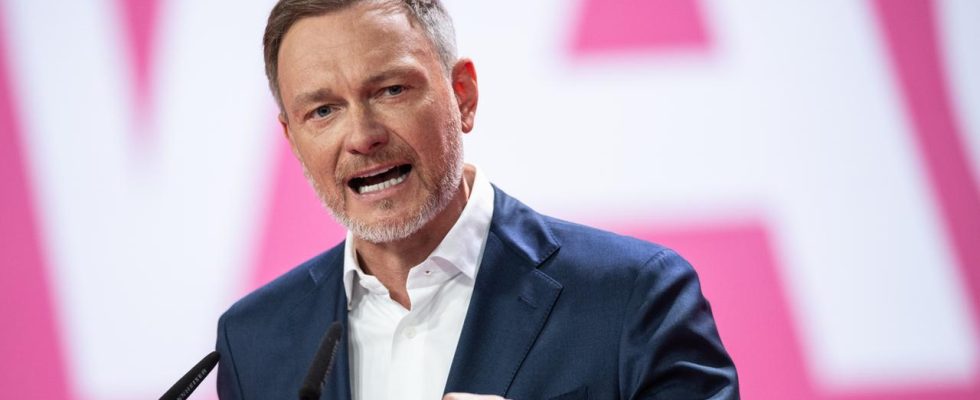For FDP leader Lindner, the objective is clear: Germany needs a reversal in economic policy. At the federal party conference in Berlin, he swore the Liberals to the change, which he presented as a cure for many problems.
Under growing federal political pressure, the FDP is holding its party conference in Berlin. In the opening speeches by the party leadership it became clear: the Liberals – as in the past few weeks – are primarily concerned with sharpening their economic policy profile.
Party leader and Federal Finance Minister Christian Lindner called for a turnaround in German economic policy. In addition to increasing Germany’s competitiveness, this is also essential for social justice and the fight against anti-democratic efforts in the country.
Among other things, Lindner criticized the complex German approval procedures for start-ups, which prevented many entrepreneurs from investing in Germany. “We have the brains, we have the know-how, we have the capital, but our country too often gets in its own way,” said the FDP chairman.
“Command social “politics of justice”
The growth perspective is also needed to reach the many people who are dissatisfied with their living situation and want to improve something. “The stagnating society leads to a hard-fought elbow competition,” explained Lindner. Therefore, economic and growth-friendly policies are “a requirement of social justice”.
At the same time, Lindner once again turned against the concept of basic child security of his cabinet colleague – Family Minister Lisa Paus. Their plans “would have reached the status of absurdity.” “Wouldn’t it be better to use these billions to provide more high-quality child care so that no one has to stay part-time against their will?” the finance minister asked the room.
He also called for the solidarity surcharge to be completely abolished. The probability of success of the lawsuits, however, “cannot be dismissed out of hand.” “Before we let Karlsruhe force us for legal reasons to have to forego the solidarity immediately and without a plan, we should rather make the clear political decision to forego it step by step in a planned manner,” suggested Lindner. The solidarity has now become a special tax on economic success for medium-sized businesses, crafts and industry, which Germany can no longer afford.
Competition should regulate the market
Economic uncertainty is a breeding ground for the rise of anti-democratic tendencies. With regard to the AfD, Lindner said: “The economic transition is the best democracy promotion law you can have.”
For Lindner, however, the path to this turnaround does not involve new debts and new subsidies. The finance minister once again spoke out against abandoning the debt brake. “The debt brake is a brake on inflation and that’s why we shouldn’t give it up unless necessary.” The minister emphasized that the future economic structure should not be determined by politicians and civil servants, but by market competition.
Lindner promises Ukraine full German support
Growth is also “not an end in itself,” but has “a deeper meaning,” emphasized Linder, with a view to wars and geopolitical crises around the world. Russian President Vladimir Putin may have attacked Ukraine, “but he means all of us and our way of life.” The FDP leader promised Kiev Germany’s full support. In the long term, however, this and the financing of German military spending “cannot be done on credit,” said Lindner. “We need our economic performance for this.”
Stark-Watzinger also demands “Economic turnaround”
“Economic turnaround now,” demanded party vice-president and Federal Research Minister Bettina Stark-Watzinger in the opening speech. “There is no doubt about that at all. Whether it’s 0.2 or 0.3 percent growth, that’s not enough.”
She viewed the excitement surrounding a 12-point paper from the Liberals before the party conference as positive. She said: “For years, economic policy has not been discussed as intensely and in detail as it is these days. Economic policy is finally back in the public eye.”
The FDP had primarily antagonized the SPD with proposals to stimulate the economy through tax relief and tightening social benefits. Before the federal party conference, the FDP presidium adopted the 12-point plan “to accelerate the economic turnaround”. Afterwards, there was renewed speculation as to whether the traffic light would last because of the completely different positions of the SPD, Greens and FDP.

